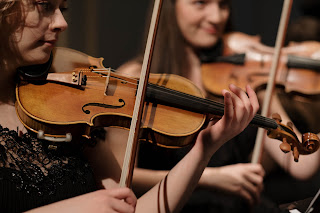If you listen to an "oldies" radio station, you may hear songs that are 40 to 60 years old. But the true "golden oldie" is classical music, which has been with us for centuries.
While satellite radio offers options for classical music listeners, TV is generally a wasteland, and over-the-air radio has transitioned to conservative talk shows and sports talk, where the volume is at max level, and anger and blame germinate.
But again, podcasting offers options that other media do not. There are at least 50 (that's a low number) classical music podcasts, and one of the best is Sticky Notes.
Sticky Notes is a classical music podcast for everyone. Whether you are a beginner just looking to get into classical music but don't know where to start, or a seasoned musician interested in the lives and ideas of your fellow artists, this podcast is for you. The podcast features interviews with the top artists of today, in-depth looks at specific pieces from the repertoire, and deep dives into each era of classical music, plus much more.
The podcast's host is Joshua Weilerstein, who enjoys a flourishing guest conducting career across the globe and has forged close relationships with many of the world’s finest orchestras and soloists.
According to Sticky Notes, "Weilerstein is praised for his expressive and dynamic presence on the podium and for his intense, eloquently moving and spectacularly knife-edge performances. With a repertoire that spans from the Renaissance era to the music of today, he combines a deep love for canonical masterpieces alongside a passionate commitment to uncovering the works of under-represented composers such as Pavel Haas, William Grant Still, William Levi Dawson, Ethel Smyth, amongst others. He is also a tireless advocate for the music of today, championing the works of Caroline Shaw, Jörg Widmann, Derrick Skye, Christopher Rouse, and more.
Born into a musical family, Weilerstein’s formative experience with classical music was as a violinist on tour to Panama and Guatemala with the Youth Philharmonic Orchestra of Boston, where the orchestra performed for thousands of young people who had never heard a live orchestra concert. This experience sparked a desire in Weilerstein to pursue a career in classical music.
While pursuing his Master’s degree in violin and conducting at the New England Conservatory, Weilerstein won both the First Prize and the Audience Prize at the Malko Competition for Young Conductors in Copenhagen in 2009 and he was subsequently appointed as Assistant Conductor of the New York Philharmonic from 2012-2015. In 2021/2022 he became the Music Director of Phoenix, a dynamic and ambitious orchestra in Boston devoted to the presentation of classical music concerts in accessible and unforgettable ways and to the promotion of music by composers whose works have been unjustly overlooked.
In 2017, inspired by the brilliant musical evangelism practiced by Leonard Bernstein, Weilerstein launched his classical music podcast called Sticky Notes. The show, for both music lovers and newcomers alike, has been a success, with more than 3 million downloads in 165 countries.
Weilerstein has the unique ability to sweep us into the world of classical music, whether we are a beginner or long-standing classical music lovers.
Consider the most recent episode about Vivaldi. Ask a non-
classical music fan to name a piece of classical music. If they don’t say Beethoven 5, or the Ode to Joy, they probably will say The Four Seasons. They might not know that it was written by Vivaldi, but the Four Seasons are a set of pieces that have made that leap into popular culture in a way that almost no other classical composition has.
Weilerstein tells us that, "The Four Seasons have been remixed, reimagined, rearranged, and recycled so many times that most classical musicians barely suppress an eye roll when they see them programmed or hear them mentioned."
Weilerstein then invites us in. "So today I’m going to take you through the Four Seasons - we’ll talk about Vivaldi’s place in musical history, program music and what that meant in Vivaldi’s time, and how music can portray nature. And I’ll try to convince any skeptical listeners out there that these pieces, far from being overplayed cliches, are actually underplayed, at least in their original form."
In a February 2022 episode, Weilerstein discusses Rimsky-Korsakov’s seminal works, Scheherezade. Perhaps no piece has captured the imagination of listeners around the world more than Scheherezade, a piece that drew upon the collection of Middle Eastern folk tales known and One Thousand and One Nights, and features some of the most legendary melodies in the history of Western Classical Music. Weilerstein gives listeners a first-chair view of the social, political, and musical trends in Russia when Rimsky-Korsakov penned his most famous work.
Although listening to Mozart when you're pregnant will not make your unborn child smarter in life, classical music not only nurtures our soul but grows our mind in ways that have been substantiated by a myriad of studies over recent years. Exposing the very young to classical music has been documented to help develop language skills, reasoning, and spatial intelligence.
What makes Sticky Notes so irresistible to the ears and the brain is Weilerstein's dexterity in bringing the music to life with his fascinating descriptions of what we are listening to and how the musical piece was constructed.
 |
| Photo by Cottonbro Studio |
Comments
Post a Comment
Thank You for your input and feedback. If you requested a response, we will do so as soon as possible.